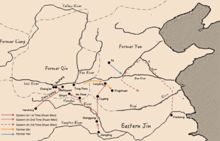Huan Wen's Northern Expeditions
| Huan Wen's Northern Expeditions | |||||||
|---|---|---|---|---|---|---|---|
| Part of Eastern Jin and Sixteen Kingdoms period | |||||||
 | |||||||
| |||||||
| Belligerents | |||||||
| Jin dynasty |
Former Qin Yao Xiang Former Yan | ||||||
| Commanders and leaders | |||||||
| Huan Wen |
Fu Jiàn Yao Xiang Murong Wei | ||||||
| Strength | |||||||
| 50,000–100,000 | 100,000+ | ||||||
| Casualties and losses | |||||||
| 40,000+ | Heavy losses | ||||||
Huan Wen's Northern Expeditions were a series of expeditions launched by the Jin dynasty general Huan Wen and aimed at attempting to reclaim Jin's territory north of the Huai River. Due to the lack of support from the Jin court, the expeditions were unsuccessful.
Background[]
Huan Wen was a general who took control of Jin forces in the 350s. Determined to expand his own prestige and reclaim the territory of China, Huan Wen led several campaigns against the states of Former Yan and Former Qin.
Expeditions[]
1st expedition[]
During the first expedition (354), Jin forces moved up the river to engage the army of Former Qin. Jin forces won a decisive victory at Lantian and defeated a Qin army of over 50,000 soldiers, reaching Chang'an. However, due to lack of food, the Jin army was forced to retreat, leaving the area under enemy control. Over 10,000 Jin soldiers died in the retreat.[1]
2nd expedition[]
Huan Wen headed north again in 356 with the hopes of capturing Luoyang. At the time, Luoyang was held by a Jin general turned rebel named Zhou Cheng (周成). Coincidentally, Zhou was attacked by the Qiang warlord Yao Xiang at the time. When Huan Wen reached Luoyang, he battled Yao Xiang along the Yi River and was victorious. Yao Xiang fled with his army while Zhou Cheng surrendered Luoyang and himself to Huan Wen. Jin held Luoyang for a decade, but would eventually lose it to Former Yan in 365. [2]
3rd expedition[]
Jin launched a major campaign against Former Yan in 369. The Jin forces defeated Yan forces and reached Fangtou, causing panic in the Yan court. However, the Former Yan general Murong Chui led 50,000 troops and stopped the Jin advance at the Yellow River. Meanwhile, Xianbei cavalry cut off the Jin supply lines and forced them to retreat. During the retreat, Murong Chui led an army to pursue the Jin forces and over 30,000 Jin soldiers were killed in the resulting battle.[3]
Aftermath[]
Huan Wen left the north humiliated by his greatest defeat at Fangtou. Dissatisfied, Huan Wen made one last attempt at seizing power by forcing Emperor Fei to abdicate through slander in 371. He was successful at first, replacing the emperor with Sima Yu (Emperor Jianwen of Jin) but the efforts of Xie An and Wang Tanzhi stopped him from furthering his ambitions. Huan Wen died in 373, never becoming emperor.
Huan Wen was succeeded by his brother Huan Chong, and his family would remain influential up until the fall of their short-lived state of Huan Chu in 404. Due to the failure of Jin to reclaim the Northern heartlands, Jin forces were soon faced with the gigantic threat of Qin.[4] Jin's conquest of Yan proved beneficial for Qin, as in its weaken state, Qin quickly annexed them in 370. With Jin not capable of carrying out another expedition, the 370s was a period which saw rapid progress in Qin's conquest, a growth that was only stopped in 383 at the Battle of Fei River.
References[]
Sources[]
- Book of Jin
- Li, Bo; Zheng Yin (Chinese) (2001) 5000 years of Chinese history, Inner Mongolian People's publishing corp, ISBN 7-204-04420-7,
External links[]
- Jin dynasty (266–420)